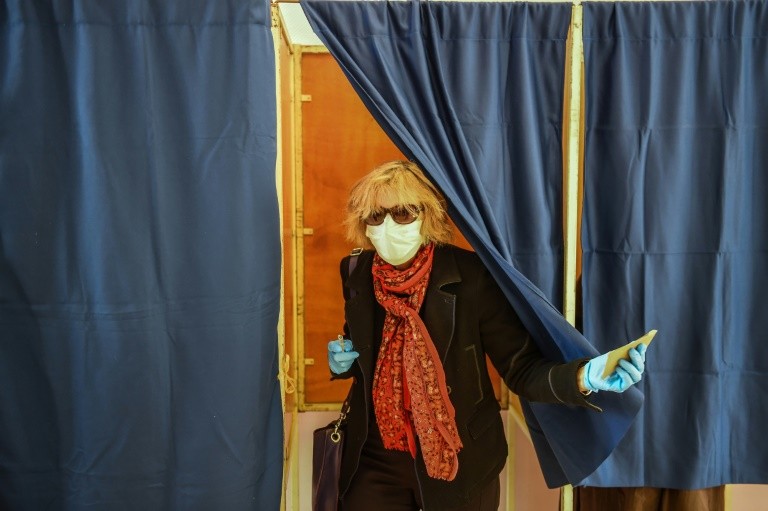France voters cast their ballots in municipal elections on Sunday expected to see the lowest turnout in decades, after the mounting coronavirus toll forced the government to close all bars, restaurants and other non-essential businesses in a bid to limit the outbreak.
Despite anti-infection precautions in place at roughly 35,000 voting stations, many people appear to be staying at home as advised by Prime Minister Edouard Philippe in a televised address Saturday night.
As of 5:00 pm (1600 GMT) only 38.8 percent of registered voters had participated, compared with 54.5 percent in the last municipal vote six years ago, the interior ministry said.
Two polling institutes later forecast that turnout would reach just 45 percent by the time the last voting stations close at 1900 GMT.
The government rejected calls to postpone the vote, saying sufficient measures had been taken to limit the virus’s spread.
“It is important to vote in these times, while being careful and respecting these rules,” President Emmanuel Macron said after washing his hands with sanitising gel and casting his ballot in northern France.
“A minimum of daily life, which allows us to go find food or vote while respecting these rules, must continue,” he said.
But many people questioned the wisdom of maintaining the vote for mayors and some half-a-million local councillors, especially if the crisis worsens ahead of the second round of voting next Sunday.
Several voters who did turn out wore surgical masks or disposable gloves, and many brought their own pens or bottles of gel.
The streets of Paris were eerily empty, its usually bustling restaurants and cafe terraces shuttered under emergency measures announced hours before polls opened.
France is one of the European countries hit hardest by the virus, with some 4,500 out of 150,000 confirmed global infections and 91 of more than 5,700 deaths worldwide.
“One must vote,” Bernard Gallis, 66, told AFP upon leaving an otherwise empty polling station in Aulnay-Sous-Bois outside Paris in the morning.
“There is no one here, and the risk is low,” he said, gesturing towards the balloting station where his wife and six officials seated at tables laden with political party pamphlets were the only other people.
But Gallis said his children, aged 40, 36, and 32, were not planning to vote because of the virus risk.
– ‘Important to vote’ –
France has indefinitely closed daycares, schools and universities, banned gatherings of more than 100 people, and urged residents to limit their movements in a bid to curtail the spread of the virus.
Fresh restrictions announced late Saturday included shutting all non-essential businesses including cafes, restaurants, cinemas, libraries, shopping centres and gyms until April 15 in a bid to prevent hospitals becoming overrun with sick people. Food stores and pharmacies remain open.
On Sunday, the government said long-distance trains and international flights will be limited and public transport reduced.
Museums, theatres and tourists sites such as the Eiffel Tower have already closed, and Justice Minister Nicole Belloubet said courthouses would close starting Monday for all but “essential litigation.”
But officials hoped that regular cleaning at voting stations, where floors have been marked with tape to keep people one metre (3.3 feet) from one another, would reassure voters.
“It went well. There were not too many people and everyone respected the one-metre distance,” said 50-year-old Laurence Berthier in the 13th Arrondissement of Paris.
A recent opinion poll found 28 percent of potential voters in France were “concerned” about the risk posed by mingling at polling stations, which are often hosted at schools.
Critics say this could impact on the outcome, especially if certain demographic groups — such as older people who tend to vote more on the right — stay away in larger numbers than others.
The election will be a key test for Macron, whose party swept Paris in the 2017 presidential election, but has since lost popularity amid a string of strikes and protests.
In a further complication, Macron’s chosen candidate Benjamin Griveaux withdrew from the Paris race over a sex video scandal, and then-health minister Agnes Buzyn was parachuted in as a last-minute replacement.
AFP
